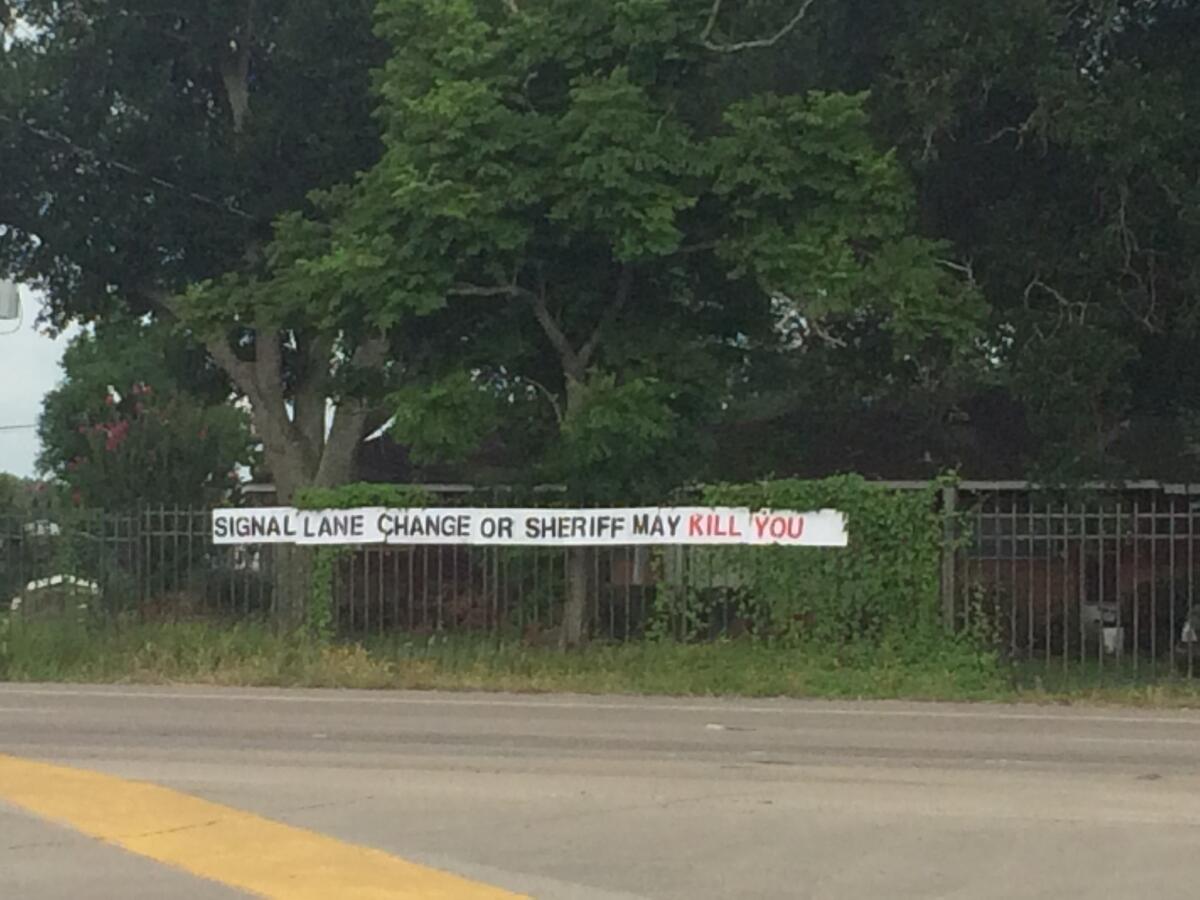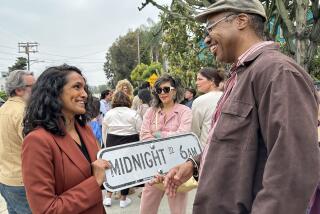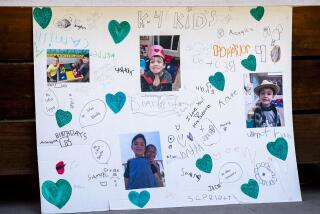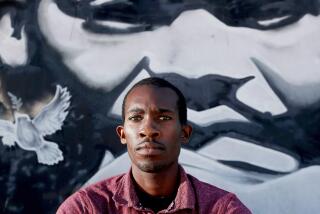A sign for Sandra Bland: ‘Signal lane change or sheriff may kill you’

A few days after Sandra Bland’s July 13 death in jail, this sign was put up near the spot where she was pulled over and arrested by a Texas state trooper. Prairie View residents don’t know who posted the sign.
Reporting from Prairie View, Texas — The sign was homemade, all but two words written in black on white strips of paper attached to a wrought iron fence facing University Drive, the gateway to Prairie View A&M University.
“Signal lane change or sheriff may kill you,” it said. “Kill you” was written in
red.
Sandra Bland had come to the area from Chicago for a job interview on July 9 at Prairie View, a historically black school that was her alma mater. She was stopped the next day by a state trooper for failing to signal near the entrance on University Drive and then arrested on suspicion of assaulting the officer.
For some, the sign struck a chord.
“It was a comment about what happened,” said Mike James, 54, the former video coordinator for the Prairie View football team.
James said Bland’s traffic stop “made no sense to me. The only reason she changed lanes was to get out of the way” of the trooper. James walked to campus Friday on University Drive so he would pass a memorial erected at the site where she was stopped.
Bland, 28, was found dead in her cell July 13 at the jail run by the Waller County sheriff’s office about 60 miles northwest of Houston, hanging from a partition by a plastic bag. Her death was ruled a suicide in an autopsy released Friday.
A photograph of the sign went viral after it was posted online Tuesday, retweeted thousands of times, often with comments. “Wow, is that sign really there? Faith in humanity,” wrote Tish, or @DonaRozeW. “Worth repeating,” wrote Keegan Stephan. “Driving while black is dangerous in Texas!!” tweeted Yvette Rani of Austin, Texas.
But later Tuesday, the sign had disappeared.
“I don’t know why they took it down,” James said. But then he added, “This is a Democratic, black area surrounded by white Republican people. They’re afraid of the political repercussions.”
The home behind the fence where the sign was posted is like many in the surrounding leafy Alta Vista subdivision: a battered single-story brick ranch house. The driveway was cluttered with a tangle of children’s bicycles, a basketball hoop, fishing gear, baseball helmets, a grill and a deep fryer.
The young African American mother who answered the door Friday had red eyes and said she had grown tired of dealing with the sign. She did not want to give her name, worried about retaliation.
When the sign first appeared a week after Bland’s death, she feared for her family’s safety. She was upset at whomever put it there, saying she thought: “You just put a target on our backs.”
She pulled it down. By Tuesday, someone had posted the sign again.
“So I cut it down,” she said.
No one at neighboring businesses seemed to know whose idea the sign was — no one at the tax office, watermelon stand, barbershop or textbook store.
“Whoever did it, they’re crying out,” said Audrey Saul, who was cleaning out her Saul’s Wheel’m & Deal antique shop down the street.
Saul, 50, admired the sign maker’s bravery. But she also understood the fear of the young mother who took it down. “Until people get the fear out of them …,” Saul said as she stood outside her shop in the afternoon heat, shaking her head.
“Let’s move forward and rise up. Exposure is the only thing that’s going to help now,” she said, setting off in her cowgirl leggings, sandals and purple and gold polo shirt (Prairie View colors) to ask neighboring businesses and bystanders about the sign.
She tried another barbershop. But the owner had not seen the sign, nor had he ventured out when Bland was stopped across the street, where her memorial now stands at the foot of a towering live oak.
“They are so afraid in this town. They don’t want any retaliation. Like the barber said: He didn’t go out,” Saul said as she left.
She tried nearby PV Grocery. The owner had not seen the sign. In the parking lot, she spotted her former brother-in-law, who made some calls to friends around town, but got nowhere.
She called the Rev. Walter Pendleton of Pendleton Chapel Baptist Church in nearby Hempstead, then walked to the memorial to wait for him, saying, “He probably knows. I bet he did some investigating.”
She passed a small white wood frame church, Hope AME. After the pastor, the Rev. Lenora Dabney, spoke at Bland’s memorial on campus Tuesday, she said, she received threats.
By the time Saul reached the memorial, an older African American man from Georgia was snapping photos with his phone. Bland’s photograph was affixed to the tree trunk, surrounded by fabric roses, many yellow, and a heart-shaped barrier of white stones.
David Levell, 62, of Atlanta had come to visit his grandson at the university, and brought him to see the memorial.
“They talk about it all over Georgia,” the postal worker said of the case, adding that it resonates with him.
“I’ve been pulled over myself, stopped unnecessarily. I’ve had them stop me and ask where I’m going” — even in his postal uniform, he said.
“I think he abused his authority,” Saul said of the trooper.
“I do too,” Levell said. But, he added, “nothing will come of it.”
Just then, Pendleton and his wife arrived in matching red shorts and white T-shirts. No word on the sign-maker, he said: Residents are concerned about speaking up, even leaders.
“We couldn’t get these local pastors here,” Pendleton said.
“People are so afraid,” Saul said.
“They can’t shut me up!” Pendleton said, adding that he wants the district attorney removed, accusing him of selective prosecution.
Saul crossed the street to question a man in a Chicago Bulls jersey smoking in front of Amistad Bookplace. Chris Benard, 34, never saw the sign, but he agreed with its message.
“People got to realize we are all targets,” said Benard, who grew up in South Los Angeles and now works as a cook at the university.
Like others here, he doesn’t trust local and state investigators who, he said, “are going to protect their own.” Saul told him she’s waiting for the results of an independent autopsy the family’s lawyer has said they will pursue.
But even with an independent autopsy, Benard said, Bland still “can’t speak for herself.”
“A lot of the truth we won’t ever know,” he said.
More to Read
Sign up for Essential California
The most important California stories and recommendations in your inbox every morning.
You may occasionally receive promotional content from the Los Angeles Times.











